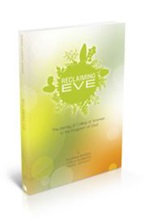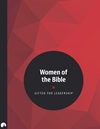Reclaiming Eve: The Identity & Calling of Women in the Kingdom of God

The book:Reclaiming Eve: The Identity & Calling of Women in the Kingdom of God
By Suzanne Burden, Carla Sunberg, and Jamie Wright
Published by Beacon Hill Press
Why I picked up this book:
I had several reasons for picking up this book. For starters, this book is written by three women, Suzanne Burden, Carla Sunberg, and Jamie Wright, who all love the Lord and are faithful students of his Word. Not only do they care about the authority of the Word of God, but they also love the church, study church history, care about people, and firmly believe that God has a redemptive purpose for all women. I know this personally because one of these women is my prayer partner whom I have journeyed with through seminary studies.
Who should read Reclaiming Eve and why:
This is a book of substance. It takes what we know from Scripture and challenges us to apply those truths to our daily lives. The authors do this by first acknowledging the identity crisis that women face every day. Women are no different from men in our struggle to clearly define who we are and who we will serve. For Christians, much of those decisions are not simply determined in our homes of origin or the culture in which we live. Many Christian women desperately seek to find those answers in the truths of God's Word, as we should.
The problems arise, however, when we seem to draw conflicting messages from the biblical text. What do we do with those passages like 1 Timothy 2:11-12: "A woman should learn in quietness and full submission. I do not permit a woman to teach or to assume authority over a man; she must be quiet" (NIV)? If you are a devout student of the Word, you cannot ignore them and you must dig to find out what they meant in the proper biblical context and what they mean for us today. In short, passages like these only affirm what we already know, that sin has entered the world and as a result, the relationships between God and humans, the relationships between men and women, and indeed all of our earthly relationships have been broken as a result of the Fall. However, this truth is not the beginning and it is certainly not the reality that God intends for his redeemed people.
The truth is that men and women were both created in the image of God. The truth is that God had every intention for Adam and Eve to live in harmony with each other and to rule the earth under his lordship. The truth is that women need each other and as Christians, God has called us into a great sisterhood of encouragement, love, and mentoring and we can do that only if we are secure in our identity in Christ and the contribution he has called us to make individually and collectively for his kingdom. The truth is that God wants us to bring all of ourselves to him because he is the only one who can heal us and make us whole. Only those who have been truly healed and restored can actively join in God's work to restore his broken community, for God desires for all creation to grow and flourish. This is the hope that was ushered in by Christ and this is the hope and message of the gospel that is shared throughout this book for those who have an ear and desire to listen.
Who should read this book? Anyone who wants to own an identity that is shaped by the gospel's message and understand their calling to commitment and community in the kingdom of God.
What's in store for you:
This book does challenge you to wrestle with troubling passages concerning women, not by offering a theological teaching on those passages but rather by helping the reader understand how much of our theology concerning women in the church has been shaped by early church fathers like Augustine, Thomas Aquinas, and Tertullian, who did not have a redemptive worldview concerning women.
Instead of discussing biblical interpretation, the authors are inspired by and seek to build on the research of author Carolyn Custis James, who challenges women and men to define ezer (pronounced with a long "a" like razor). This is the Hebrew word used in Genesis 2:18 when God said, "It is not good for the man to be alone. I will make a helper who is just right for him." So much of what we can learn from the Bible is lost in translation and this is one of those instances. When God created Eve, he created an ezer. Our understanding of the English word "helper" just doesn't assist us in understanding God's purpose for women. It helps to understand that the Bible actually uses this Hebrew word most often to define God himself as a rescuer of Israel. As an ezer, God created an intimate ally for Adam. The authors of this book define the ezer Eve as a "strong power and agent of rescue," and that also defines us, my sisters.
My personal takeaways:
I love the idea of "unfreezing Eve from the story of her sin." Who wants to be remembered only for the mistakes they have made in life? Pastors hesitate to preach a sermon about David without recalling his sin with Bathsheba. The elder may not share the stories of Moses or Paul without reminding the congregation that they were murderers. Jacob was a polygamist, Abraham pimped out his wife on two separate occasions, and Peter denied Jesus three times. These were small parts of the stories of many whom the Bible call faithful. I'm not suggesting that we leave these parts of the biblical biographies out or make light of these sins. I'm simply acknowledging that God is greater than the sins of these biblical characters, while also asking us to consider that maybe in our own sinfulness, there is something that compels us to magnify the dark places in the life of another at the expense of the good that is also very present before us. This is what we have done to our sister and mother Eve.
Unfortunately, we do not know much about Eve beyond her exodus from the garden, but we long to know her and deeply, for we–as women–know in the very core of our being that truly understanding Eve means that we also better understand ourselves. Yes, we are all sinners and have fallen short of the glory of God. Yet we cannot continue to allow Eve's sin to define her any more than we, as Christians, allow sin to master us. She and we are defined as image bearers of God and ezers to whom God has given the power and authority to reign on his behalf and cause all things on earth to flourish. That is Eve's story, and it's God's story, and that is very good!
Twitter-worthy quotes:
"When we go about the process of reclaiming Eve, we will also find ourselves reclaiming Adam."
"The truth is, Jesus came to redeem and restore the community that was lost when Adam & Eve sinned."
Other books I would recommend along this line:
When Life and Beliefs Collide by Carolyn Custis James
Lean In by Sheryl Sandberg
What Women Tell Me by Anita Lustrea
Natasha Sistrunk Robinson is a writer, inspirational speaker, leadership and mentoring trainer, and human trafficking advocate. She received her M.A. in Christian Leadership from Gordon-Conwell Theological Seminary (Charlotte) in May 2014, with concentrations in prayer and fasting, racial reconciliation, and biblical justice. Natasha has over fifteen years of experience leading and mentoring in personal, professional, and church settings. Connect with Natasha through her official website, blog, Facebook, or Twitter.












